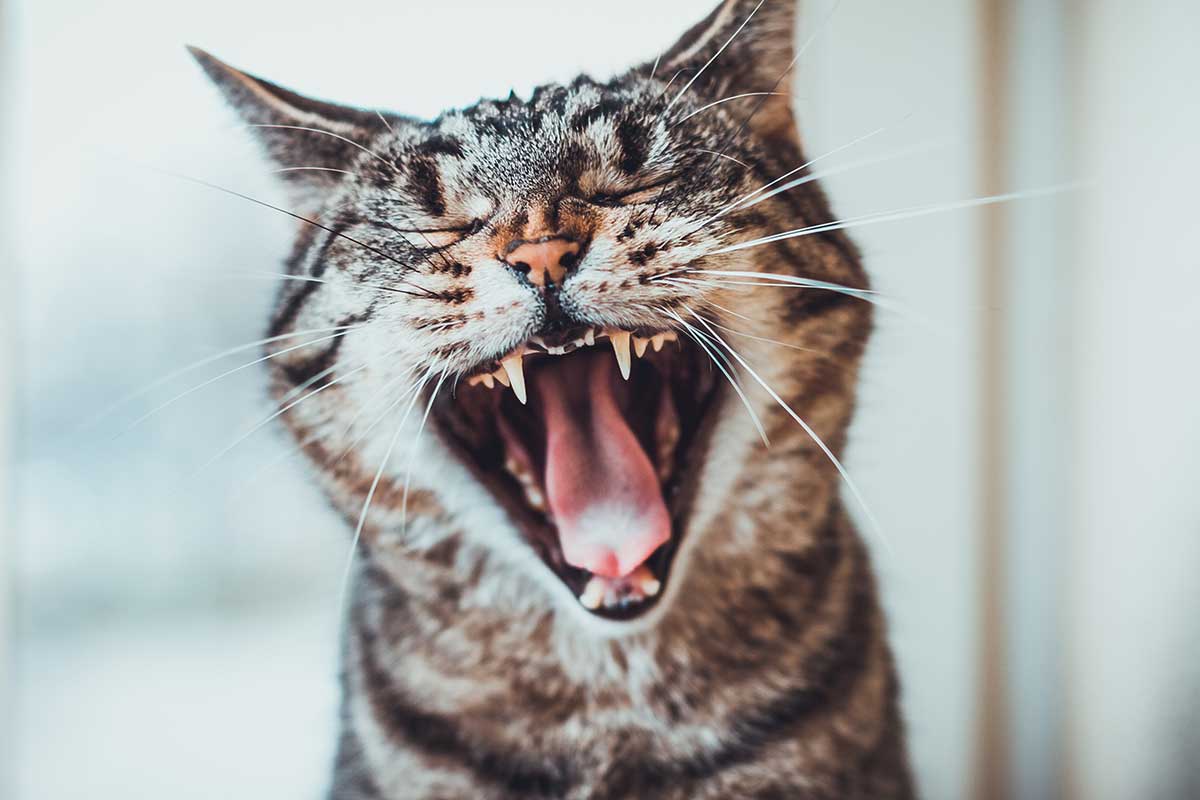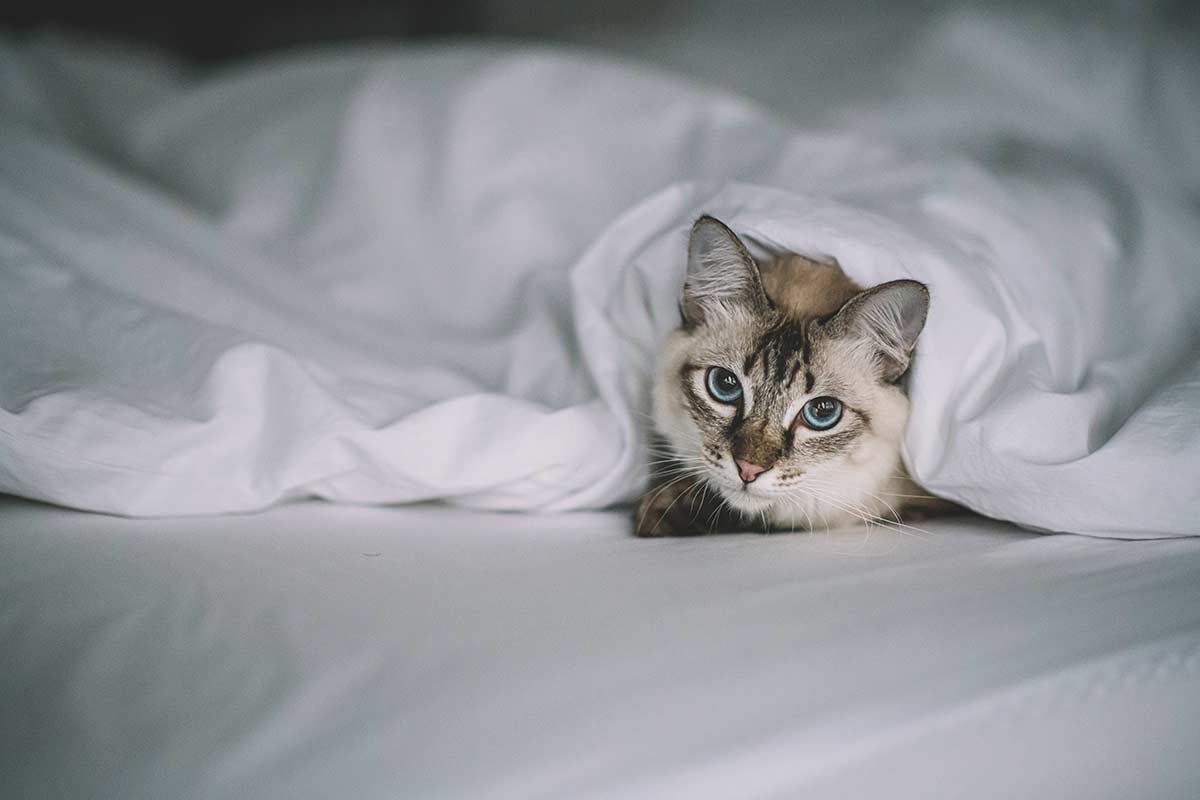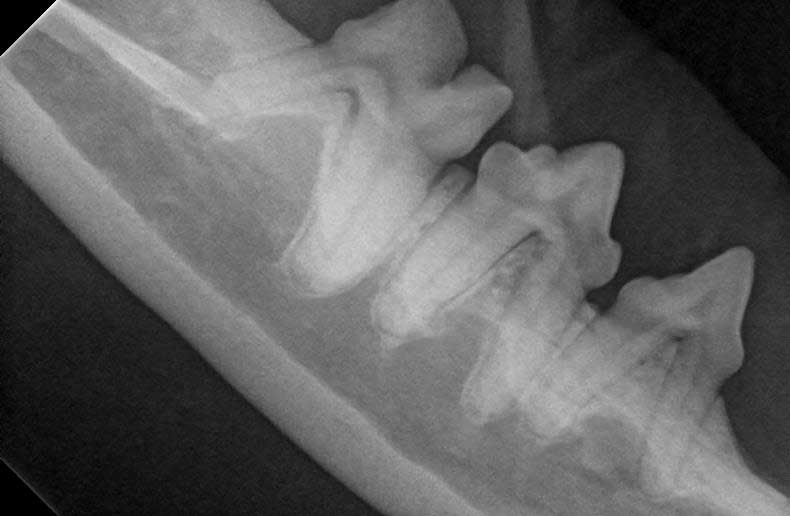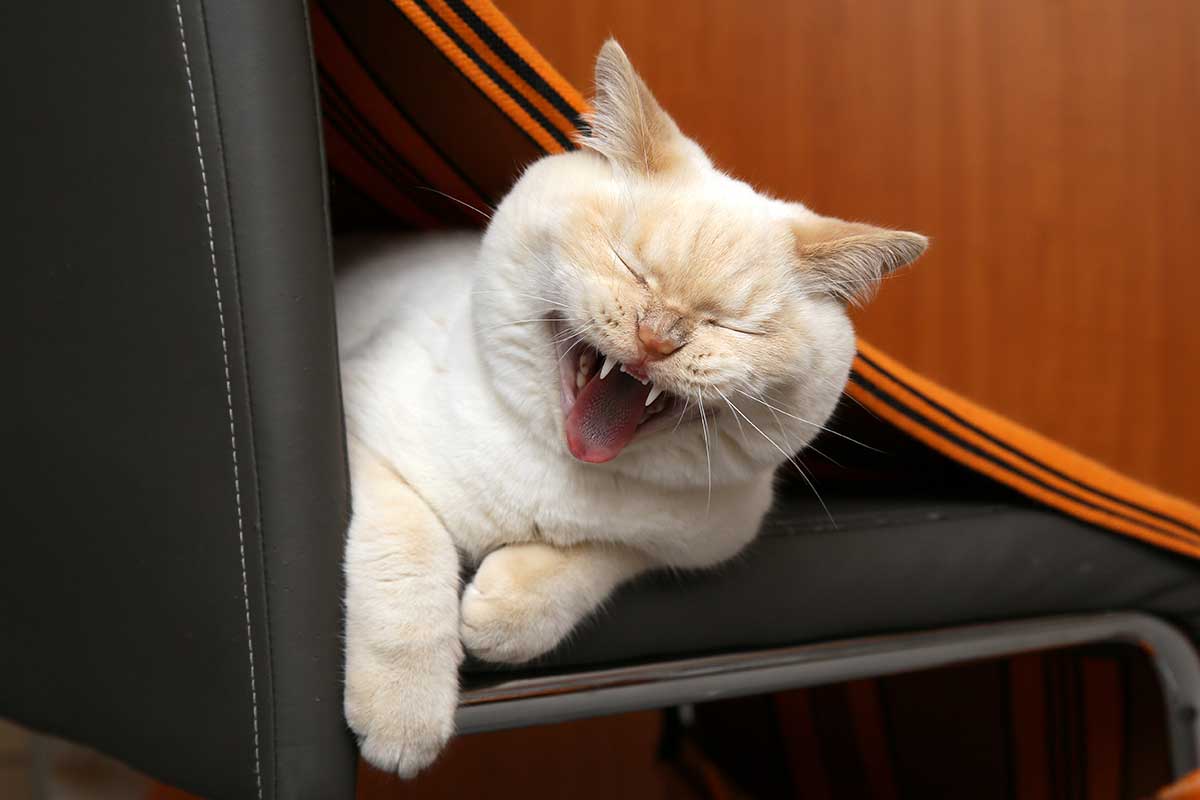Feline Dental Care for Your Cat’s Unique Needs

Cats are masters of disguise, and their dental issues often go undiagnosed because they show little or no obvious evidence of discomfort. (Surprising fact: Tooth pain does not decrease appetite in cats! That’s because cats do not actually chew their food.) This makes it important to work closely with feline-specific veterinary practices who not only recognize signs of dental disease in cats, but know how to effectively treat them.
Surprising fact: Tooth pain does not decrease appetite in cats! That’s because cats do not actually chew their food.
When left untreated, dental disease in cats can be extremely painful and will negatively affect their quality of life. Periodontal disease in the mouth can cause health problems in other parts of the body. Bacteria from unhealthy gums, for example, can enter the bloodstream and target organs like the heart or kidneys, especially if these areas are already damaged at all. When bacteria from a diseased mouth pours into the bloodstream, even an otherwise healthy cat can become more susceptible to health issues. When the body is constantly busy fighting that bacteria, less energy is available for other important tasks such as battling other health problems or manufacturing new red blood cells.

Common Dental Issues for Cats
Feline dental problems tend to develop slowly and, over time, can cause your otherwise happy cat to become grumpy or withdrawn. Just like in humans, dental pain relief can completely change your cat’s quality of life (and personality!) for the better. Here are some of the most common feline dental issues we see:
- Tartar accumulation: While tartar accumulation is normal, your cat’s genetics and diet can change how quickly plaque and tartar forms on teeth, and how reactive your cat’s gums are to that tartar. Without the proper attention, plaque and tartar cause gingivitis, and will eventually lead to periodontal disease. Our team will examine your cat to determine how often he or she needs professional cleanings. Cleanings improve dental health by removing tartar, treating gingivitis, and identifying and treating periodontal disease if present.
- Resorptive lesions: Resorptive lesions are an important dental problem which is rare in people but very common in cats. These lesions begin inside the tooth and move outward. Although the cause of this disease is unknown, we can extract affected teeth to immediately relieve the pain that resorptive lesions cause. Regular dental exams, including dental X-rays, allow us to find and address problems like resorptive lesions early enough to prevent painful and serious health complications for your cat. Untreated resorptive lesions will often lead to broken teeth, exposed nerve tissue, and severe pain.
- Dental trauma: Broken teeth are fairly common for cats. A fracture exposing the pulp of the tooth is painful and can allow infection to take hold in and around the tooth. When a tooth is fractured into the pulp cavity, immediate extraction is indicated.
So Your Cat Needs a Dental Cleaning! What to Expect:
BEFORE Your Cat’s Dental Appointment:

- Preliminary Visual Assessment: We will complete a preliminary visual assessment of your cat’s oral health at a previous visit, along with a full health evaluation and an anesthetic risk assessment. (In special cases, we can arrange to have all of this done on the same day, using our in-house laboratory resources!)
- Pre-Dental Anesthetic Planning: As part of the pre-dental assessment, your cat vet will have assessed your kitty’s overall health, medical history, and organ function, and will have created a PURRsonalized anesthetic protocol plan, designed to minimize physical stress, accommodate any individual problems, and optimize outcome. All anesthetic events carry risk; at UCVC, we go above and beyond to make sure your kitty has the best and safest possible anesthetic experience.
- Treatment Plan: After your cat’s pre-dental visit has been completed, your veterinarian will prepare and email you a customized treatment plan for your kitty. We will also send any necessary explanation of particular dental needs or anesthetic concerns. This plan will be based on the visual assessment, dental history, and any particular risk factors that we may have identified, and will include an estimated range of possible associated costs.
- Dental Treatment Appointment: When you call to arrange an appointment for the dental work, we will ask that you put down a deposit to reserve your cat’s dental spot. A Client Care Specialist will then email you a confirmation, and a copy of the treatment plan and estimated costs for you to review and approve beforehand. We will also handle admission forms in advance, so when the procedure day arrives, all you have to do is bring in your kitty!
ON THE DAY of Your Cat’s Dental Appointment:

- Home Preparation: There is not much preparation you’ll need to do! We ask that you not feed breakfast the morning of your cat’s dental appointment. A small amount of food (a tablespoon or less) is okay, if needed to administer a pre-visit sedative such as gabapentin. Please do NOT withhold water at any time. We will provide food as soon as your kitty is awake after the anesthesia.
- The Dental Procedure: Your kitty will be placed under a full general anesthetic for the dental procedure, with IV fluid support, heat support, multi-parameter monitoring, and a dedicated veterinary technician to monitor and manage the anesthesia. Once asleep, your kitty’s teeth will be completely cleaned and polished, using exactly the same kind of equipment your own dentist uses. We then perform full mouth dental radiographs. The dental surgeon will assess those radiographs and perform periodontal exploration throughout the mouth, identifying any lesions that might indicate a need for oral surgery such as extraction of diseased teeth, especially any that may not have been obvious on the preliminary visual assessment. With your advanced permission, the dental surgeon will address any identified problems on the spot, performing whatever work is necessary. Afterwards, we will treat the teeth with fluoride. We give post procedural laser therapy if anything beyond simple cleaning has been done. All patients receive Pulsed Electromagnetic Field Therapy during recovery, which helps decrease both pain and inflammation. We then awaken your kitty slowly and gently from anesthesia, in the arms of a dedicated team member until fully awake. Your kitty is monitored closely afterward, in quiet and peaceful surroundings, until recovery is complete.
- At Home Afterwards: If your kitty had any surgical work performed, he or she will be sent home with appropriate postoperative analgesic medication. We administer the first dose before your kitty goes home, and we’ll send instructions about how and when to give any remaining doses. Home recovery expectations should vary with the extent of the work done. Kitties who’ve had a simple cleaning with no oral surgery will probably be back to normal the evening of the procedure or the following day. Extensive oral surgery may take a few days to recover from, but your kitty should be reasonably active and eating well within 24 hours.
- Antibiotics Rarely Need To Be Given At Home: Only a small minority of patients need antibiotic treatment during or after a dental procedure; most do not. Systemic antibiotic therapy is NOT an appropriate part of standard routine dental care. It is indicated only in specific instances. Most periodontal infections will clear without antibiotic therapy once the affected tooth is removed. When necessary, most antibiotic needs can be met with the infusion of an antibiotic gel into the affected area during the procedure. Long-acting antibiotic injections, which are very harmful to the kitty’s resident “good guy” bacterial biome, are never given at UCVC.
AFTER Your Cat’s Dental Work:

- Enjoy! Enjoy knowing that your kitty’s overall health has been substantially improved! Enjoy your kitty’s improved breath! Enjoy the satisfaction of knowing that any oral pain your kitty had is gone!
- Home Dental Care: At UCVC, we understand that brushing your cat’s teeth can be a very stressful exercise that can damage your relationship with your cat. There are alternative methods of helping maintain healthy teeth; methods more similar to those that wild cats use — and those can be both fun and nutritious! We can help you find the methods that work best for your cat. We do not recommend ANY commercial dental products or supplements, and especially not commercially manufactured “dental treats.”
- What To Expect Next: Just like people, even with assiduous ongoing home care, your cat’s teeth will need cleaning sometimes. Dental home preventive care can slow the buildup of tartar, but cannot stop it. Because dental cleaning for cats requires full anesthesia, it is not reasonable to plan on an arbitrary “every six months” dental procedure like people do. A decision to perform dental work requires a risk / benefit assessment — in other words, the benefits to be gained from dental work should outweigh any associated risks. Individual cats vary greatly in their needs for dental cleanings: some cats will need cleanings every six months, like people; others maybe once in their entire lives. As with most elements of PURRsonalized medical care, there is no “one size fits all.” At UCVC, your cat vet will help you weigh all your kitty’s current health factors so that you can make an informed decision about when it’s time for a dental cleaning again.
- Follow Up Care: We offer complimentary recheck appointments for all dental procedures (typically 10-14 days after the procedure). This visit may not be necessary if surgery wasn't performed during your cat's dental appointment. We strongly recommend rechecks for any patient who has had one or more extractions. Cats hide everything, this recheck will help catch any developing comlications.
Considering an “Anesthesia-Free” Dental Cleaning? DON’T!
“Anesthesia-Free" dental cleanings are not really cleanings at all. While they may produce some cosmetic results (at the expense of pointless stress to your cat), they cannot address the periodontal disease that is the real health threat.
Without full anesthesia, effective dental therapy cannot be performed in cats because:
- If periodontal disease has progressed (as most will without regular professional dental cleanings), deep periodontal pockets develop with large amounts of tartar. Inserting dental instrumentation into these pockets is very painful if the patient is awake, and removing tartar from these pockets cannot be accomplished without full anesthesia.
- A cat that is not under anesthesia could breathe chunks of tartar or infected materials into the lungs. Our patients are fully anesthetized, with an endotracheal tube in place which prevents aspiration of any debris produced during the dental cleaning process.
- To accomplish a full and accurate evaluation of your kitty’s dental problems, full mouth dental radiographs, and deep probing around all teeth are both necessary. Both require full anesthesia. Without these, numerous important dental problems can be (and often are) missed.
- Your kitty’s teeth must be polished after removing tartar to remove scratches on the enamel that could turn into future pockets for tartar. Polishing is noisy and is almost impossible to safely perform on a cat that is not under anesthesia.
More specific information on this topic is available here.
A healthy mouth leads to a happy cat! We love helping our cat patients get healthier and happier at Uniquely Cats Veterinary Center. With a fully-equipped Feline Dental Suite, including state of the art digital dental radiology, we provide the highest quality of feline dental care in a calm and peaceful location.
Call (303) 500-5158 to learn more or to schedule a dental appointment for your cat.


